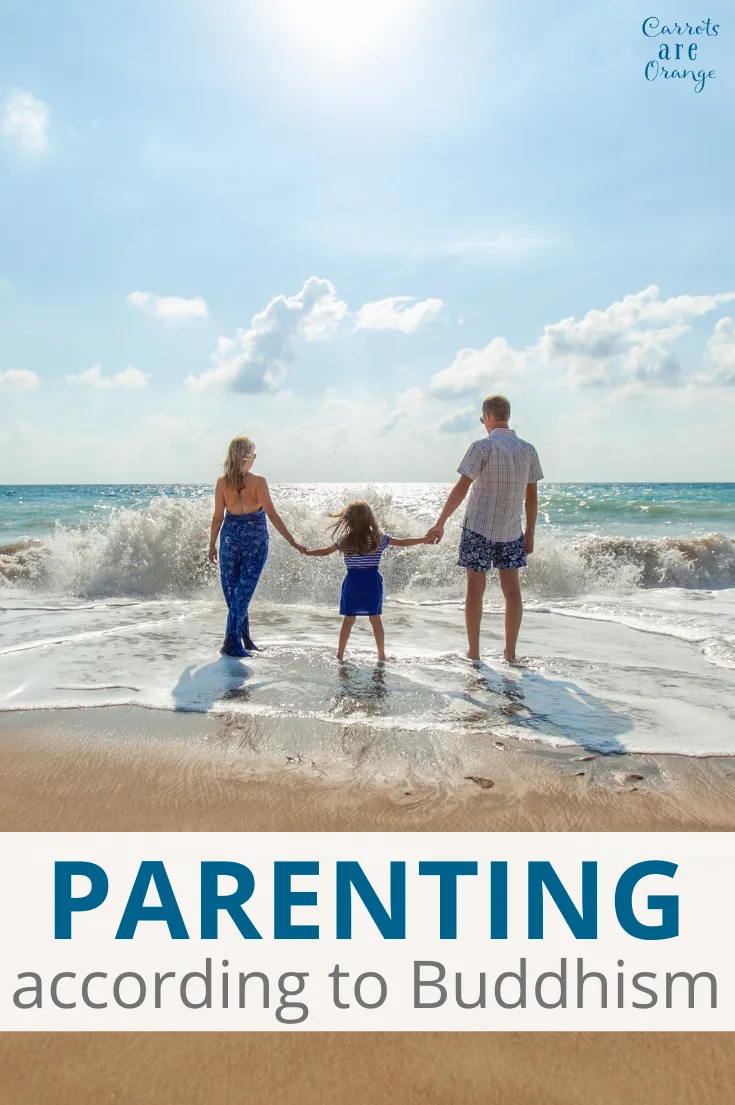Raising children is a lifelong endeavor. From crib to college and beyond, your offspring remain a part of you. Parenting is a demanding pursuit, and throughout all of life’s stages, stress and hardship are inevitable.
With that in mind, our existence, with or without children, is prone to stress and hardship. Life is a challenge for everyone; surviving and thriving takes continuous effort. This piece is a layperson’s interpretation of the four main tenets, or noble truths, of Buddhism and how they can relate to the task of parenting.

Four Noble Truths of Parenting According to Buddhism
#1 – Life is Suffering
Without getting into much detail, the core principle of this truth is that we as human beings are fated toward suffering. The concept of suffering needs to be interpreted in the broadest sense possible; it’s not meant to be a doomsday prophecy.
In simple terms, suffering is inescapable due to the imperfectness of our human condition and surrounding environments. Our bodies, minds, landscapes, and plans will always in some way be inadequate.
This reality, in turn, has the potential to create our suffering, be it on a grand scale or a minor inconvenience. Parents are highly prone to any form of suffering in relation to the lives of their children.
#2 – Desire is the Cause of Suffering
A simple interpretation of this second truth brings attention to the fact that broken or unfulfilled desires lead to suffering. Unmet expectations failed plans, and inadequacies have the capacity to create negative emotions.
Parents exist in a world filled to the brim with expectations of not only their children but also themselves. Of course, expectations are important and necessary guides throughout the course of our lives.
With respect to how the second tenet of Buddhism can be applied to parenting, acknowledgment of the limits on our control and awareness of our emotions gives us a stronger acceptance of this truth.

#3 – Elimination of Desire Ends Suffering
The third noble truth of Buddhism states that we can escape our suffering if we eliminate our desires. Furthermore, our desires are rooted in our attachment to things, ideas, places, etc. This truth may seem nonsensical or perhaps, ironically, undesirable.
Desires guide our lives; they provide us with motivation and help us build a framework for our existence. Without being able to live the life of an ascetic monk, how is this prospect possible? A parent needs to take this third tenet with a grain of salt; however, the wisdom it provides can still be applied to our role.
Acceptance of the imperfect, flawed nature of life and how that applies to us and our children grant an awareness of this particular truth. Form your expectations realistically and be prepared for setbacks.
#4 – Follow the Eightfold Path in order to Eliminate Desire
The fourth noble truth of Buddhism builds upon the foundation of the first three and sets out eight proper or right ways of living that by their virtue guide practitioners of Buddhism into enlightenment. Enlightenment brings about an end to suffering.
Laid out simply, the eightfold path promotes the rightness of belief, resolve, speech, action, livelihood, effort, thought, and meditation.
The simplest way for a layperson and parents to adopt this tenet into their life is to be aware of the eight paths presented. Self-awareness and an appreciation for these eight aspects of existence can prompt us to be better parents.

Ultimately, the intrinsic beauty of Buddhism is its universality. For those who know little of its background and purpose, this religion is exclusively about living life the right way and seeking enlightenment.
The theories and wisdom of Buddhism can be applied to the life of any parent, regardless of their religious beliefs and practices.
Whether or not you associate with a Buddhist organization, the four noble truths contain wisdom that is timeless. Parenting is also timeless, and there are no one-size-fits-all approaches and no such thing as a perfect family.
Your life and the life of your children fit within the realm of Buddhist teachings. Acknowledgment of our human condition and its relation to the Four Noble Truths may bring to you a degree of enlightenment in your life as a parent.

